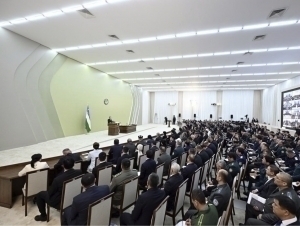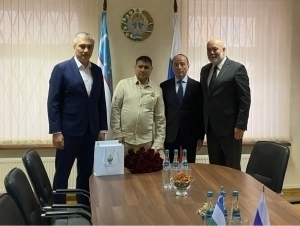Uzbekistan: Children abused and humiliated; Internal Affairs under scrutiny for mistreatment — Weekly Analysis
Review
−
31 May 2025 14663 12 minutes
In 2024 alone, 412 children in Uzbekistan were victims of sexual violence. Another 1,028 were subjected to physical abuse, while 929 suffered psychological pressure. Fourteen children were exploited, and 106 faced complete indifference from adults. These figures represent only the reported cases. The harshest forms of abuse often occur within families—many of which remain unreported and hidden from public view.
Tragically, violence against children continues to reflect deeper issues within Uzbek society. A child who grows up in an environment of abuse is more likely to repeat the cycle, becoming an abuser themselves. While Uzbekistan has adopted various legal frameworks for the protection of children's rights, and while efforts have been made to return children from cotton fields to schools and homes since 2016, many now face forced labor within their own families. Alarmingly, both voluntary and forced child begging has become widespread. This reflects the current reality for children in Uzbekistan. The impact of neglect and physical, sexual, and psychological violence on young lives is evident in several incidents that made headlines this past week.
Internal Affairs officers accused of torturing suspects
Three officers of the Internal Affairs Department committed a serious crime in Tashkent. Disturbingly, they abused their authority and tortured a suspect in custody. It raises the question: were these officers themselves once subjected to such treatment, now perpetuating the cycle?
The incident involves an inmate at a residential colony in the Zangiota district of Tashkent region. In August 2024, the inmate conspired with several individuals to distribute a large quantity of narcotics. He informed an inspector of the Postul-Post Service that the drugs were hidden near an unfinished building along Katta Khalka Yuli Street. The plan was for his accomplices to collect the drugs using a black Spark car. The inmate asked the inspector to ensure the operation went smoothly.
On the night of August 4, 2024, the inspector and an accomplice surveilled the location—outside their designated service area. Notably, one of the inspector’s accomplices was unaware that a drug stash was involved.
When the suspects arrived, the inspectors detained them on suspicion of drug trafficking. The complicit inspector pretended to discover the narcotics, which he already knew were hidden at the site, and placed the material evidence on his car trunk—without the presence of any official witnesses.
Later, officers from the Yangihayot District Internal Affairs Department arrived. The senior operative conducted the investigation without notifying superiors and reportedly tortured the suspects during interrogation.
One of the detainees testified that he was subjected to inhumane treatment after refusing to confess.
“They took me to a room without a camera. They handcuffed me and forced me to stand with my arms raised against the wall. Several black plastic bags were placed over my head and wrapped with tape. I was suffocating. Then they beat me on the back and legs and used an electric shock,” the victim recounts.
A medical examination later confirmed multiple injuries, including bruises and burns consistent with the use of electric shock. According to another suspect, officers punched them in the stomach and face. One officer reportedly used a can of mosquito repellent as a weapon, striking them with it. The officers also burned the suspects’ beards and threatened to burn one of them alive unless he testified against his acquaintances.
Three other individuals—friends of the suspects, including a woman—were also handcuffed and taken to the Yangihayot District Internal Affairs Department without legal representation. One of them sustained serious bodily injuries after reportedly refusing to sign documents. According to a medical report, he suffered head trauma, other physical injuries, and signs of psychological distress.
Another detainee said he was tortured with elements of sexual abuse. He alleged that officers removed his pants, held a lighter to his genitals, and threatened to burn him unless he confessed.
At the trial held by the Chilonzor District Criminal Court, the officers partially admitted their actions. One of the three denied direct involvement in the physical torture, claiming the suspects had written their explanatory letters voluntarily. However, the victims firmly stated they had been physically abused.
By court verdict, the senior operative of the Yangihayot District Internal Affairs Department, born in 1987, was sentenced to five years and one month in a general regime colony. One PPH inspector, born in 1986, received 11 years, while another inspector, born in 1991, was sentenced to five years and one month.
This raises a critical question: how did such individuals come to wear the uniform and insignia of law enforcement officers? Are they public servants or something closer to criminal enforcers? The Ministry of Internal Affairs, which often issues swift responses to deaths in custody or reported torture cases, has remained notably silent in this instance.
The issue of torture during the investigative process in Uzbekistan has long been a matter of public concern. Although laws require interrogation rooms to be equipped with surveillance cameras and victims to be compensated for torture and discrimination, the practical implementation of these measures remains inconsistent. Despite repeated criticisms by the President himself regarding abuse in the system, there has been little meaningful change on the ground.
Woman penalized for insulting and resisting a traffic police officer
While the Yangihayot District Department of Internal Affairs has not yet responded to recent allegations against its officers, the Tashkent City Main Department of Internal Affairs issued a statement this week regarding a separate incident. The department commented on a viral video showing a woman using abusive language toward a traffic police officer and confirmed that legal action had been taken.
According to the report, the incident began when a traffic police officer stopped a Gentra vehicle after noticing that the driver was using a monitor, a violation of traffic regulations. The officer attempted to issue an administrative citation. However, the driver refused to sign the document and resisted the officer's lawful actions.
During the incident, a woman approached from behind and verbally insulted the officer. In the presence of witnesses, the officer proceeded to issue a fine. Upon checking the woman's documents, authorities discovered she had previously been stripped of her driver's license and did not have a permit for the tinted windshield on her vehicle.
The officer impounded the woman's car and attempted to issue a formal report, but faced further resistance.
As a result, the woman was found guilty of violating Part 1 of Article 41 (Insult) and Part 1 of Article 194 (Failure to comply with lawful orders of an internal affairs officer) of the Code of Administrative Responsibility. She was fined 30 times the basic calculation amount.
The male driver was found guilty of violating Part 1 of Article 183 (Petty hooliganism) and Part 1 of Article 194 of the same code. He was sentenced to 10 days of administrative arrest.
Another woman involved in the incident was also found guilty under Part 1 of Article 194. She was fined three times the basic amount.
Macron and Brigitte: Misinterpreted moment sparks online buzz
In an unrelated international development, French President Emmanuel Macron made headlines this week after a video circulated on social media appeared to show his wife, Brigitte Macron, striking him as they disembarked from a plane in Vietnam, the first stop on his Southeast Asia tour.
The video shows President Macron at the door of the aircraft, briefly conversing with someone inside. At that moment, a hand reaches toward his face and makes light contact with his chin. The president appears momentarily surprised but quickly composes himself and continues to greet those present. Brigitte Macron, dressed in the same outfit seen in the video, follows him down the steps.
President Macron later confirmed the authenticity of the footage, clarifying that it was a moment of playful interaction between him and his wife.
Former U.S. President Donald Trump, known for his quick commentary on international affairs, weighed in on the video. He advised the French couple to resolve personal matters privately and stated that he had spoken with Macron, who assured him that "everything is fine" within the family.
Tournament suspended following public scandal
Ethics and aesthetics in children are shaped through culture and the arts. However, when modern culture fails to uphold these values, its influence may be less constructive than intended. If today’s cultural and artistic figures truly served as role models, we would not witness inappropriate public behavior, whether in the form of excessive displays of affection at events or verbal altercations online. Still, it’s important to acknowledge that genuine artists—those who carry culture in their hearts rather than merely their reputations—do exist.
On May 29, a public scandal erupted at the “Jar” stadium in Tashkent following the conclusion of the LikeCup football match. The incident involved a confrontation between artists and bloggers, which escalated into a physical altercation.
According to reports, a citizen born in 2004—one of the match participants—sparked a dispute on social media, apparently in an attempt to attract more followers and gain publicity. Actor Alisher Uzokov, who hosted the event, stated that this PR-driven behavior quickly spiraled out of control.
The Shaykhantohur District Department of Internal Affairs Coordination conducted an investigation into the incident and held preventive discussions with those involved. Due to widespread public criticism and the violation of legal norms, the LikeCup project has been temporarily suspended.
Organizers of the tournament, as well as the individuals who instigated the scandal and those who participated in it, were identified. An administrative protocol was drawn up under the relevant articles of the Code of Administrative Responsibility, and the case has been forwarded to the Shaykhantohur District Criminal Court for further legal proceedings.
Uzbek imam leading Hajj pilgrimage passes away in Medina
Rabbimkul Muhammadiev, the imam-khatib of the “Rakat” mosque in Tashkent’s Yakkasaroy district, passed away in Medina last week while leading a group of pilgrims during the current Hajj season.
On May 23, Imam Muhammadiev departed from Tashkent to Medina as the leader of the capital’s 38th pilgrimage group. During the flight, he fell asleep and did not regain consciousness. Upon arrival at Medina International Airport, medical staff found him in a coma and unresponsive to stimuli. He was immediately transferred to a local clinic for urgent care.
Doctors diagnosed him with acute cerebral circulation disorders, structural changes in the brain stem, and cerebral edema. A neurosurgical operation was performed on May 24 in an effort to reduce the brain swelling. Despite medical efforts, the imam’s condition did not improve, and he passed away on May 26.
Militants in Afghanistan pose a threat to Central Asia – Belousov
The primary threat facing Central Asia is the potential infiltration of radical armed groups operating in Afghanistan into neighboring countries. This warning was issued by Russian Defense Minister Andrei Belousov during a meeting of the Collective Security Treaty Organization (CSTO) on May 28. The CSTO includes all Central Asian countries except Uzbekistan and Turkmenistan.
Belousov stated that more than 20 armed groups are currently active in Afghanistan, with a combined force of over 15,000 militants.
“Radical groups may cross into neighboring states, increasing the risk of destabilization. In addition, instability in the Middle East is negatively impacting the region. Foreign militants engaged in armed conflicts are spreading not only to Afghanistan, but to other Central Asian nations as well,” he said.
Since the Taliban’s takeover of Afghanistan on August 15, 2021—when Kabul fell without resistance and President Ashraf Ghani fled the country—the international community has urged the formation of an inclusive government. These appeals include demands to uphold human rights, particularly women’s access to education, end drug production and trafficking, dismantle terrorist networks, and halt armed threats to both Afghanistan’s neighbors and the wider international community.
However, the Taliban interim government has largely ignored these demands, despite repeated appeals from the United Nations, the United States, and the European Union. In diplomatic engagements, including summits in Doha and talks with other states, Taliban representatives have pledged not to threaten the sovereignty or security of neighboring countries.
In a related development, on April 17, Russia’s Supreme Court approved the Prosecutor General’s administrative request to temporarily suspend the ban on the Taliban’s activities within the country. This was the first ruling under a new law passed in December 2024, which permits the temporary lifting of bans on organizations listed as terrorist entities.
Electronic entry application now required for visa-free travel to Russia
Beginning June 30, foreign citizens from countries with visa-free access to Russia—including Uzbekistan—will be required to submit an electronic application before entering Russian territory. Those who fail to do so will be denied entry.
The change comes under Resolution No. 1510, issued by the Russian Government on November 7, 2024, as part of the second phase of a pilot program aimed at enhancing migration control.
Under the new procedure, foreign nationals and legal representatives of minors or incapacitated persons must complete the electronic application no later than 72 hours before their intended arrival. In urgent cases—such as the need for emergency medical care, serious illness, or the death of a close relative—applications may be submitted up to 4 hours prior to travel.
Russian authorities describe the measure as a significant step toward more effectively managing migration flows and improving national security.
Uzbekistan introduces new law on child protection
On May 15, Uzbekistan enacted the Law “On the Protection of Children from All Forms of Violence.” While currently only in its early stages of implementation, the law is expected to undergo amendments and additions to fully integrate it into the country's legal system.
Experts emphasize that for the law to have meaningful impact, both state and society must show active responsibility. Legal norms alone will not bring change unless attitudes toward children also shift.
The message is clear: if serious attention is not paid to the treatment and upbringing of children now, the consequences could be dire—not only for the children themselves, but for society as a whole.
Live
All



